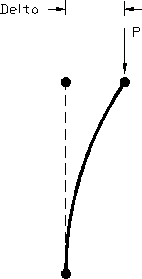P-D effect
The P-D effect occurs as a result of the ends of an axially loaded element moving laterally with respect to each other. A moment of P.D is induced which alters the element's equilibrium and causes the relative element end movement to change further.

P-D effect
Unless the axial load P exceeds the element's critical buckling load, a point of equilibrium eventually occurs such that the P-D moment is balanced by moments applied by other elements or restraints.